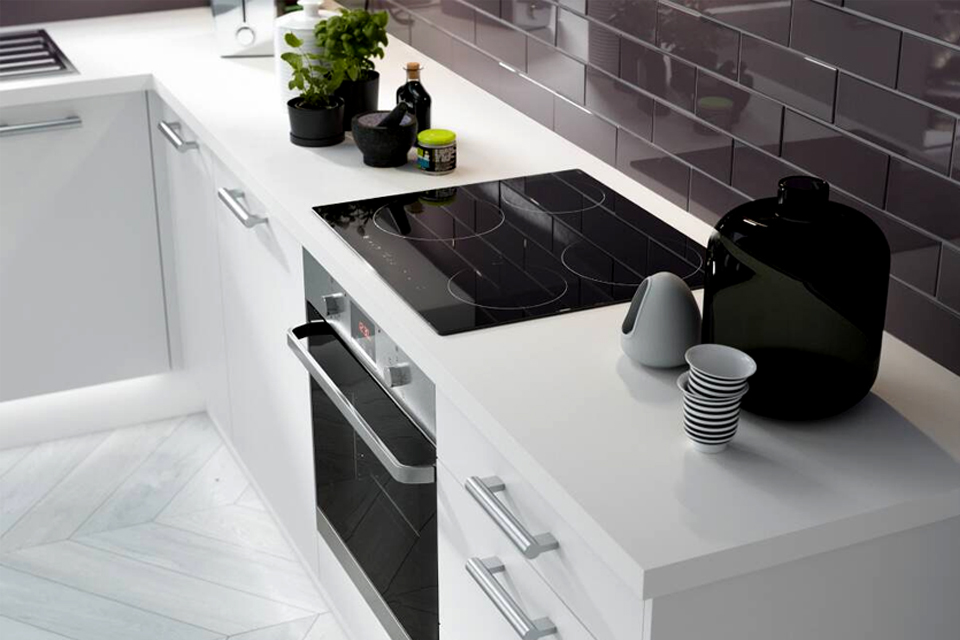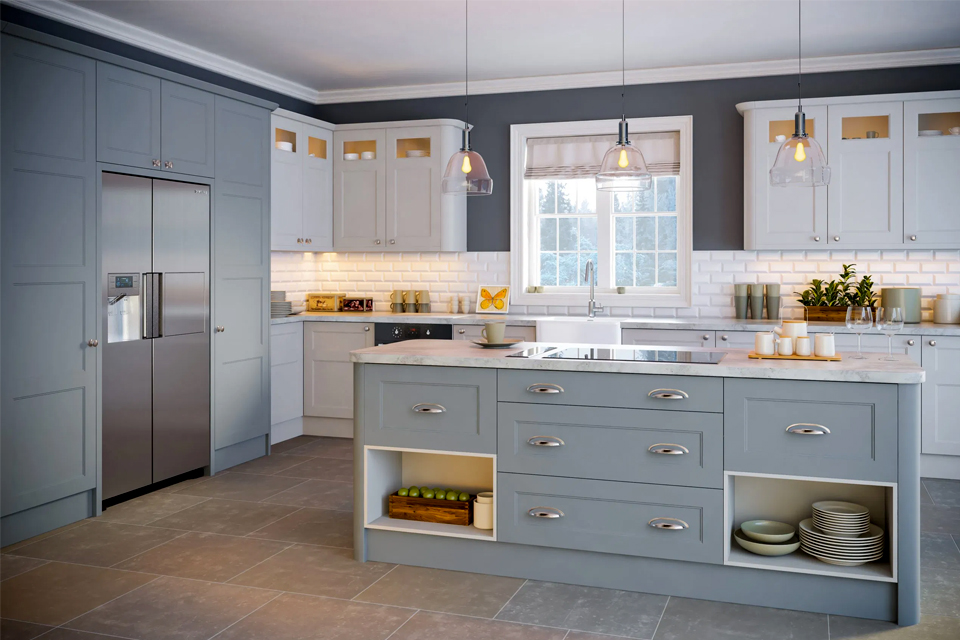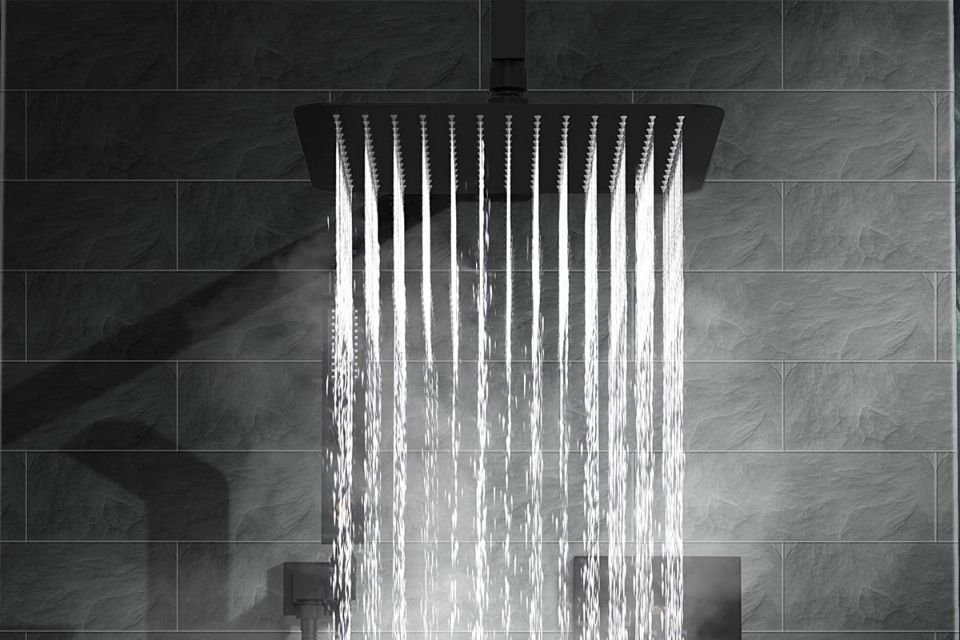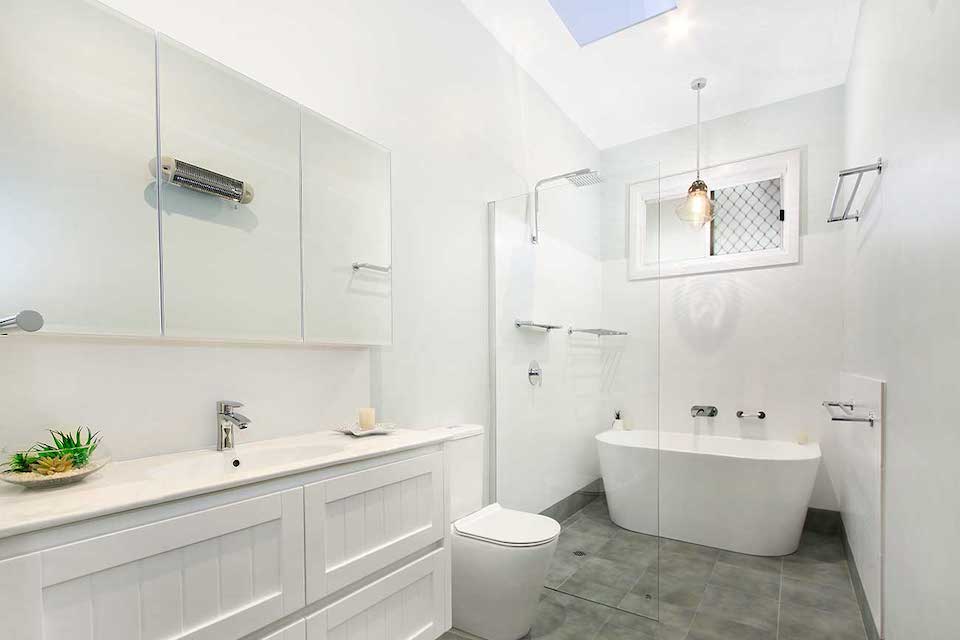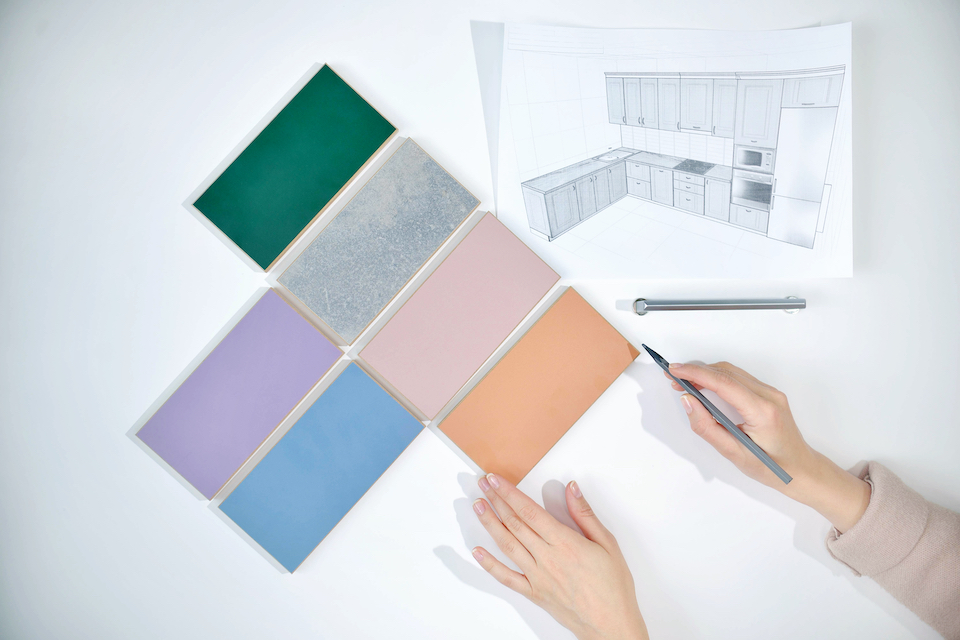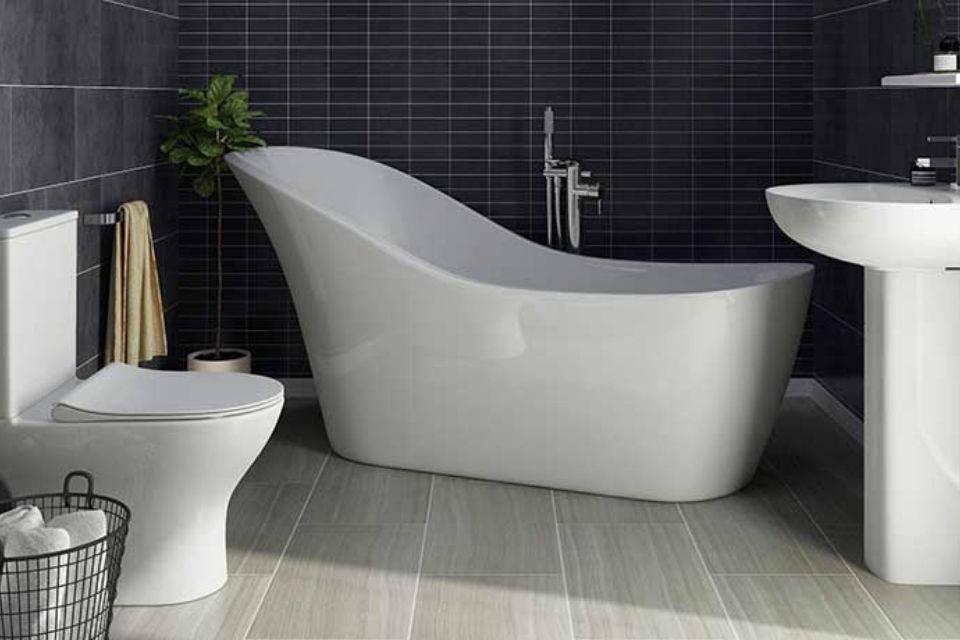How Much to Replace Kitchen Worktops?
The average cost of replacing kitchen worktops will vary greatly depending on the materials that you use and the size of your kitchen.
The cheapest type of worktops are usually laminate worktops
So what are the options?
These type of worktops typically cost around £20-£50 per square metre.
It's all about the quality...
If you are looking for average quality wooden worktops, these will cost around £50-£150 per square metre.
Granite worktops are a popular type of worktop, but these can be quite expensive at around £250-£400 per square metre.
Kitchen Worktops Prices in 2025
There are many different types of worktop materials, so the prices for new worktops can vary.
Below is a list of the different types of worktops and their costs. The costs show the average costs for a standard-sized kitchen with a worktop space of 3 metres squared, a width of 600mm and a thickness of 20mm.
| Kitchen Worktop | Average Cost |
|---|---|
| Laminate worktop costs | £260-£350 |
| Solid wood worktop costs | £350-£650 |
| Granite worktop costs | £950-£1,400 |
| Marble worktop costs | £1,100-£1,700 |
| Quartz worktop costs | £800-£1,700 |
| Glass worktop costs | £1,100-£1,700 |
| Slate worktop costs | £470-£1,100 |
| Concrete worktop costs | £950-£1,700 |
| Copper worktop costs | £1,100-£1,700 |
- How Much to Replace Kitchen Worktops?
- Supply Cost of Kitchen Worktop Replacement
- Factors That Impact Kitchen Worktop Replacement Costs
- Additional Kitchen Worktop Replacement Costs
- Labour Cost to Replace Kitchen Worktops
- How Long Does It Take to Replace Kitchen Countertops?
- What’s Involved in Replacing Kitchen Worktops?
- Types of Kitchen Worktops
- How much Does It Cost to Remove Kitchen Worktops?
- FAQs
Supply Cost of Kitchen Worktop Replacement
If you’d prefer to install the worktops yourself and avoid the cost of hiring a professional, it’s important to factor in the cost of materials separately. DIY fitting can be a more budget-friendly option, but you'll need to ensure you have the right tools, skills, and measurements before starting.
Below are supply-only prices for a variety of kitchen worktop material types to help you understand the costs involved.
| Kitchen Worktop | Average Cost Per m2 |
|---|---|
| Laminate worktop costs | £20-£50 |
| Solid wood worktop costs | £50-£150 |
| Granite worktop costs | £250-£400 |
| Marble worktop costs | £300-£400 |
| Quartz worktop costs | £200-£500 |
| Glass worktop costs | £300-£500 |
| Slate worktop costs | £100-£300 |
| Concrete worktop costs | £250-£500 |
| Copper worktop costs | £300-£500 |
Replacing your kitchen worktops is one of the quickest ways to refresh the look and feel of your entire kitchen without a full renovation.
Factors That Impact Kitchen Worktop Replacement Costs
There are three main factors that will affect the cost of replacing your kitchen worktops. The type of worktop, the size of the surface area you need to cover and the thickness of the worktop.
Type of Worktop
The type of worktop you choose plays a major role in the cost of the job. Different materials require different installations, which can affect the complexity of the work. For instance, laminate worktops are a popular option for those looking for a basic finish and easy installations, while natural materials like granite and marble offer a more premium look, but can take longer to install.
Heavier materials, like natural stone, often require more labour to move and install safely, especially if access is tight or the worktop needs to be lifted into place.
Size Of Surface Area
In basic terms, the larger your kitchen, the more worktop material you’ll need. If you have a long run of units, a kitchen island, or extra features like breakfast bars, the size of the surface area you need to cover increases.
If you have custom shapes to cover, or wrap-around corners, this will require more cutting, joining, and fitting, so it could mean you need more material than you think and can add additional labour costs to the job.
Worktop Thickness
Not all worktops come in the same thickness. Standard options typically include 1.2 cm, 2.8 cm, and 3.8 cm. The thickness you choose can affect both the look and feel of your kitchen, as well as how the worktop performs over time.
Thicker worktops tend to be more durable and resistant to damage. This makes them a good choice for busy kitchens. They also give a more solid, premium appearance. However, thicker materials cost more and can be heavier, which may require more labour to install.
It is recommended to hire a professional to measure your kitchen worktops correctly before making decisions about materials or styles. Many companies offer this service free of charge.
Additional Kitchen Worktop Replacement Costs
There are several additional costs that you may need to think about when it comes to replacing kitchen worktops. Below is a list of the additional things that you may need to budget for with this type of work:
New Kitchen Installation
When getting new kitchen worktops installed, you may consider going the extra step by investing in a completely new kitchen.
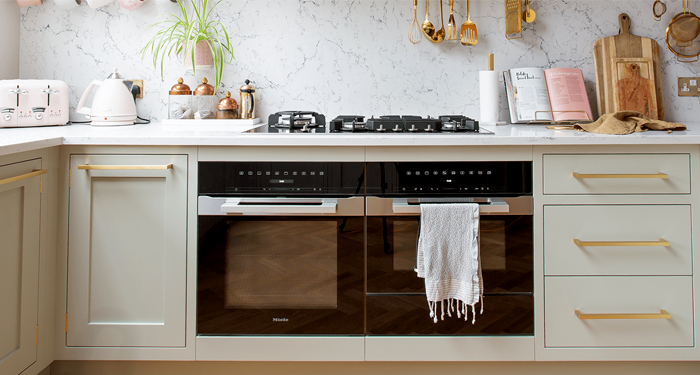
The prices for a new kitchen will vary depending on the size of the kitchen, the materials used, and your location in the UK. On average, you can expect a new kitchen installation to cost around £5,000-£12,000.
New Kitchen Cupboards
When you replace your kitchen worktops, you may also want to consider replacing your kitchen cupboards too to give your kitchen a completely new look.
The cost of replacing kitchen cupboards will depend on the number of cupboards that you have in the kitchen. You can expect to pay roughly £90-£200 per kitchen cupboard.
New Edging Strips
If you want to give your new kitchen worktops a beautiful and tidy finish, then you may want to invest in edging tape. This allows you to cover the cut ends of the worktops so that they match the rest of the worktops.
This will cost around £9-£12 for a 3m roll of worktop edging tape.
New Kitchen Sink
If you are working on your kitchen, then you may also wish to replace a kitchen sink. The space for the sink will be cut out in your new worktops, so once this is done, you can easily install a new sink in place of the old one.
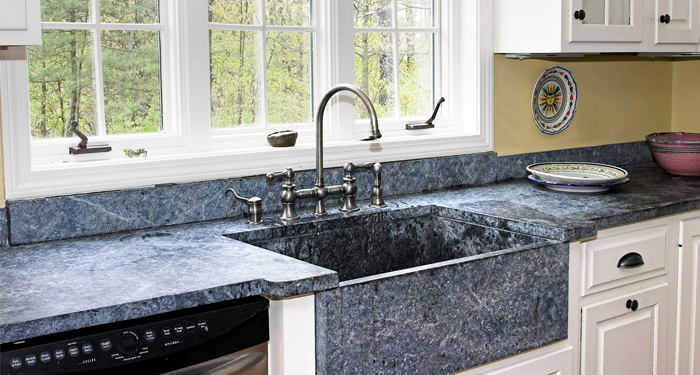
The average cost for a new kitchen sink is around £30-£300. The price you pay will depend on the material and size of the new sink.
New Kitchen Flooring
While you are upgrading your kitchen worktops, you may also want to think about installing new kitchen flooring.
There are many different types of kitchen flooring materials to choose from. Budget options include tile kitchen flooring which costs around £15-£200 per square metre, laminate kitchen flooring for £16 to £65 per square metre, and vinyl flooring for £11-£45 per square metre.
More expensive options include natural stone flooring, which costs £25-£35 per square metre, and solid wood flooring that typically costs £72-£116 per square metre.
Labour Cost to Replace Kitchen Worktops
If you are planning on purchasing the worktops before they are installed, you will need to know how much to budget for the labour costs.
When replacing your kitchen worktops, you will need to hire a kitchen specialist with the appropriate experience in fitting the type of kitchen worktops you have chosen. A contractor for this type of work will usually charge around £150-£200 per day.
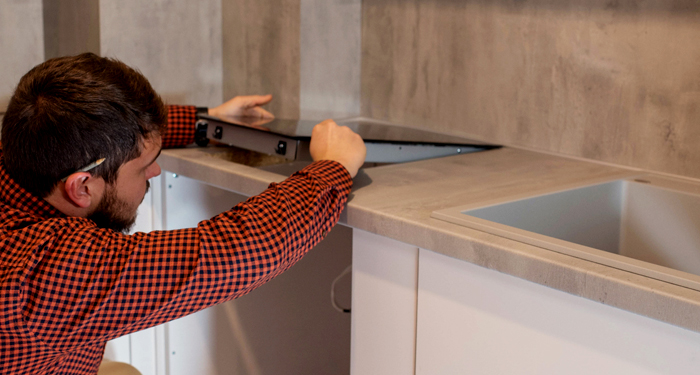
If you have a built-in hob or oven, then you will need to hire an approved Gas Safe engineer to remove these appliances and then reinstall them once the worktops are complete.
This will likely cost around £60-£100 per hour, depending on the area that you are in, and whether you choose a large or small company to handle the work.
How Long Does It Take to Replace Kitchen Countertops?
You may also be wondering about the timescales you can expect when replacing your kitchen worktops.
Replacing worktops in an average-sized kitchen will usually take around a day to complete. A smaller kitchen may take around 4-5 hours to finish.
If the materials you are using are quite difficult, such as granite, marble, or quartz, this may increase the timeframes by a few hours. These materials require a lot of skill to ensure they are cut correctly.
If the tradesperson needs to cut around sinks or appliances in your kitchen, this could also increase the timeframe by a few hours, as it requires some skill to get these cuts completely right.
What’s Involved in Replacing Kitchen Worktops?
Replacing kitchen worktops is a great way to refresh the look of your kitchen without the cost of a full refit. Below is a step-by-step guide to what’s involved in the process:
1. Removing the Old Worktop
The first step involves removing the existing kitchen worktop. This is done by unscrewing it from the base cabinets and gently prying it away from the units. Care is taken to avoid damaging surrounding areas, such as splashbacks or wall tiles.
2. Checking Cabinet Levels
Once the old worktop has been taken out, cabinets will be checked to make sure they are level. This ensures a smooth and even surface for the new worktop to sit on. Any necessary adjustments will be made.
3. Measuring and Cutting the New Worktop
If the new worktop isn’t custom-made, it needs to be cut to size. The installer will measure the worktop area and mark the dimensions on the underside of the new surface. It will then be cut, starting from the back of the worktop to prevent any surface chipping.
4. Cutting Out for the Sink
If the kitchen includes a sink installation, a hole is cut into the worktop. The dimensions of the sink are marked out, and a cut is made around 10mm inside these lines. The raw cut edges are sealed with silicone to prevent moisture damage, and the sink is then dropped into position.
5. Fitting the New Worktop
The new kitchen worktop is fixed into place by screwing it securely to the base units. Edging strips are applied to cover any exposed edges, providing a neat and professional finish. Excess material from the strips will be trimmed or sanded down.
6. Sealing the Edges
As a final step, a sealant is applied around all the edges of the worktop, especially where it meets walls and around the sink. This will help to prevent water ingress and give the installation a clean, finished look.
Types of Kitchen Worktops
There are many different types of kitchen worktops to choose from. The material you choose will depend mostly on your personal preferences, however, certain worktops have advantages over others.
Custom vs Off-the-Shelf Kitchen Worktops
One of the first decisions you'll need to make is whether to go for custom-made worktops or an off-the-shelf option.
Each comes with its own set of advantages and disadvantages depending on your budget, kitchen layout, and personal preferences.
Custom Kitchen Worktops
Custom worktops are tailored to fit your kitchen’s exact dimensions and design preferences. These are usually made to order, so they may require a longer lead time.
Pros
- Perfect fit for unusual or complex layouts
- Wider choice of materials, colours, and finishes
- Can include custom cut-outs for sinks, hobs, and taps
- Higher quality craftsmanship and finish
Cons
- More expensive than standard worktops
- Longer manufacturing and delivery times
- May require professional installation
Off-the-Shelf Kitchen Worktops
Off-the-shelf worktops are pre-cut and available in standard sizes from most DIY stores. These are a quicker and often more cost-effective option.
Pros
- Budget-friendly
- Available immediately from stores
- Can be a DIY project for confident installers
Cons
- Limited size, material, and style options
- May not fit perfectly in non-standard kitchens
- Cutting and finishing may be required on-site
Now let us take a look at the different materials kitchen worktops come in, including their costs, and the pros and cons of each:
Laminate Kitchen Worktop Cost
Laminate worktops are the most popular type of worktop in the UK. These worktops are very versatile and come in a wide range of colours, styles, and finishes. They tend to mimic the look of natural materials, but they come at a much lower cost.
The average cost for laminate kitchen worktops is around £20-£50 per square metre.
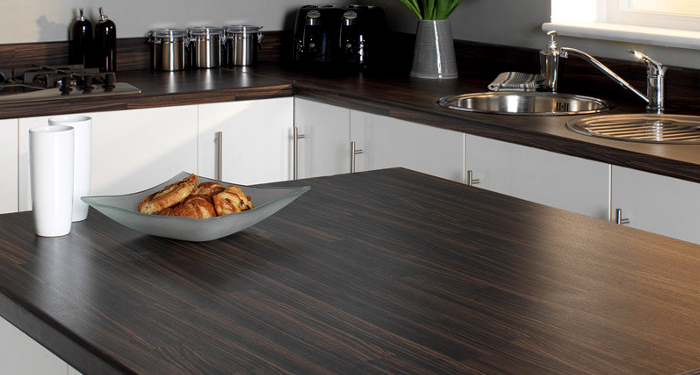
Pros
- Cheap materials
- Easy to maintain and clean
- Scratch and heat resistant
- Can look more expensive than they are
- Wide range of colours, styles, and finishes
Cons
- Can burn under excessive heat
- Unhygienic is they are scratched
- Can peel if water is left standing on the surface
- Cheap options can be damaged easily
Quartz Kitchen Worktop Cost
Quartz is a man-made stone. It has the durability of natural stone, but it comes in a wide range of colours and patterns to suit your taste.
The average cost of quartz kitchen worktops is around £200-£500 per square metres.
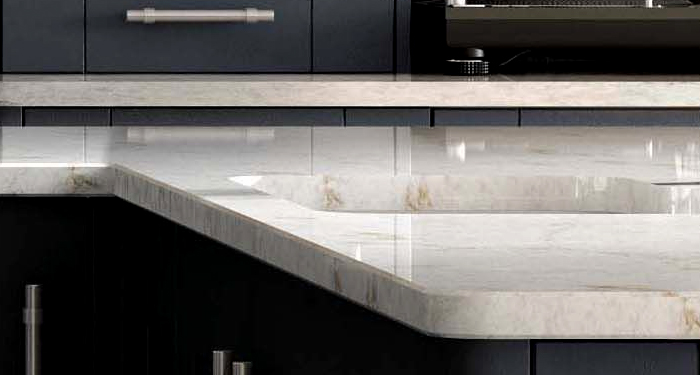
Pros
- Environmentally friendly as it’s made from recycled materials
- Resistant to water and staining
- Strong and resistant to chips
Cons
- Quite expensive
- Can be damaged by fast-changing temperatures
- Heavy material so can be difficult to install
Granite Kitchen Worktop Cost
Granite kitchen worktops are a very popular choice in the UK. These worktops give a polished and expensive look, however, granite can be hard to source. This means that most kitchen worktops that look like granite are actually made from other materials.
If you want real granite worktops, you can expect to pay around £250-£400 per square metre.
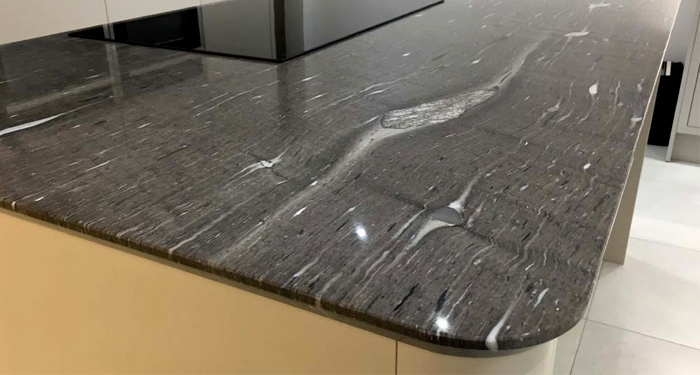
Pros
- Resistant to heat changes
- Durable and hardwearing
- Hygienic material
- Easy to clean
- Adds value to your home
Cons
- Heavy material so difficult to install
- Heavy material so needs reinforced cabinets
- Requires sealing every two years
- Difficult to repair
- Limited colours and patterns due to natural material
Marble Kitchen Worktop Cost
If you are looking for a luxury kitchen design, then look no further than marble worktops. Marble is the leading choice in luxury worktops in the UK, as it offers a timeless look.
The average cost of marble worktops is around £300-£400 per square metre.
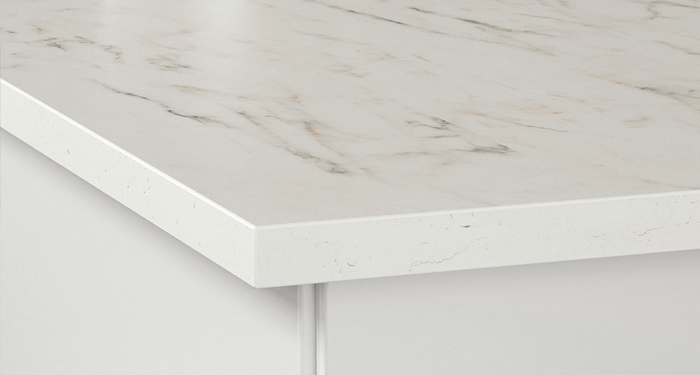
Pros
- Luxurious design
- Heat-resistant material
- Long-lasting material
Cons
- Can stain easily
- Scratches easily
- Expensive material
Solid Wood Kitchen Worktop Cost
Solid wood is a very classic finish for a kitchen. Wood is a great natural alternative to stone materials as it is a cheaper option. However, wood worktops require more maintenance.
The average cost of solid wood worktops is around £120-£250 per square metre.
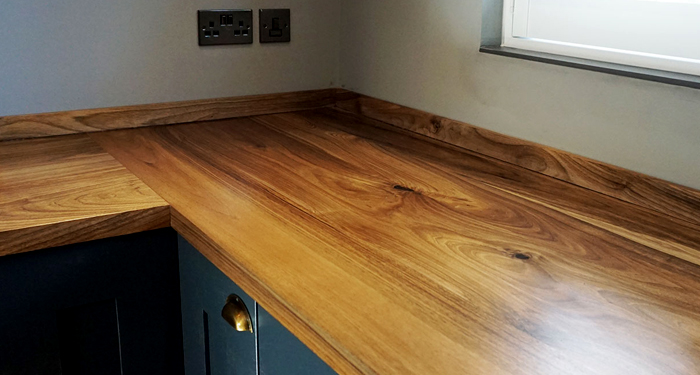
Pros
- Looks better and better with age
- The cheapest natural material
- Hygienic when maintained properly
- Unique and beautiful appearance
Cons
- Requires maintenance twice each year
- Can become stained and burned
- Can scratch easily
Glass Kitchen Worktop Cost
Glass kitchen worktops are a very modern-looking design choice. These worktops have a very glossy finish and can come in a wide range of designs and colours.
The average cost of a glass worktop is around £300-£500 per square metre.
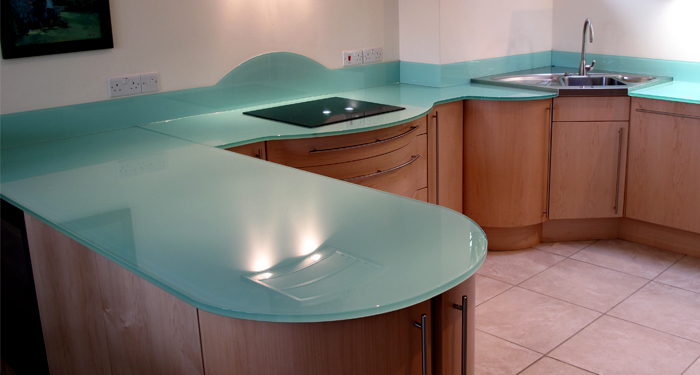
Pros
- Hygienic surface
- Easy to clean
- Resistant to staining
- Heat-resistant
- Many design options available
Cons
- Needs regular cleaning
- Can become scratched
Concrete Kitchen Worktop Cost
Concrete worktops come in a large range of colours and styles. Other materials can also be added to concrete, such as shells and stones, to give it a more unique look.
Concrete worktops can be quite expensive at around £250-£500 per square metre.
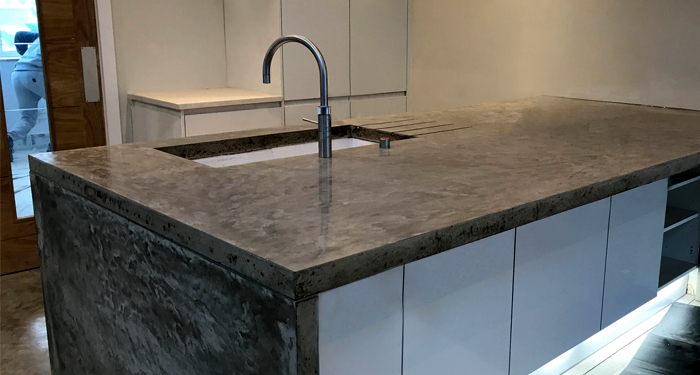
Pros
- Large choice of colours and styles
- Other materials can be added for a unique appearance
- Durable material
- Repairs can be easy
Cons
- Hairline cracks may appear if proper reinforcement isn’t used
- Not resistant to staining
- Not resistant to scratches
- Liquids are easily absorbed which can lead to bacteria growth
- Can be very expensive
- Requires significant sealing
Copper Kitchen Worktop Cost
Copper is a beautiful choice for kitchen worktops. It offers the warm appearance of wood but you can put hot pans directly on it. Copper also provides a very unique look that can blend in well with a wide variety of kitchen designs.
The average cost of copper kitchen worktops is £300-£500 per square metre.
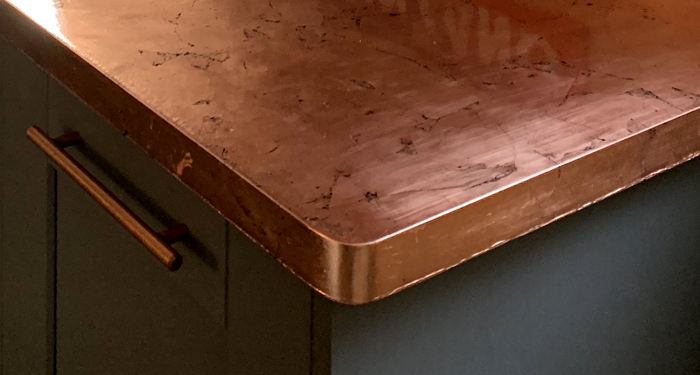
Pros
- Beautiful and unique design
- You can put hot pans directly on it
- Naturally antibacterial
- Easy to clean
Cons
- Needs to be sealed regularly
- Weathers over time
- Will oxidise over time
How much Does It Cost to Remove Kitchen Worktops?
Before you can install new worktops, you will need to have your old worktops removed. If you are having new worktops fitted professionally, then the contractors will usually include the removal costs in the overall price.
However, in some instances, you may need to pay for this work separately. If that’s the case, you can expect to pay around £100-£200 to have your kitchen worktops removed. The price will depend on the type of worktops and your location in the UK.
Once the worktops have been removed, you can either ask the contractors to take of the waste removal for you, or you can hire a waste removal company. This will usually cost around £70-£180 depending on the amount of waste that there is.
You may also want to hire a skip for a week for all of the waste. This could cost around £60-£375 depending on the size of the skip.
FAQs
Q: Can you resurface kitchen countertops?
A: You can resurface most kitchen countertops. Some examples include re-laminating, installing granite sheets, or tiling over the existing kitchen countertops. This will give your countertops a completely fresh new look without having to replace them.
Q: How do you cut a kitchen worktop?
A: When it comes to cutting kitchen worktops, it’s best to hire a professional. However, if you would like to cut them yourself, take the following steps:
- Measure the cuts properly and mark them out on the uncut worktop.
- Obtain a circular saw for the initial cuts and then a router saw for more precise cuts.
- Find a suitable place to cut the worktops such as a workbench. Make sure both ends of the worktop are fully supported and clamp it so that it doesn’t move during the cuts.
- Set the circular saw blade depth to 0 and use a straight edge to ensure the cuts are completely straight. Saw in a clean motion back and forth over and over until you fully saw through the worktop.
- Follow the same process when using the router saw.
- Once completed, you can now position your worktops on the counter to ensure no further cuts are needed.
Q: How wide are kitchen worktops?
A: The typical width for a kitchen worktop in the UK is around 600mm. If you have extra-wide kitchen worktops, these can measure around 1200mm.
Q: What is the best wood for kitchen worktops?
A: Hardwoods are the most common types of wood used for kitchen worktops. Some of the most popular types of wood for a worktop are oak, walnut, and iroko. Oak is seen as the best choice as it is very durable and offers a very pleasing aesthetic.
Q: How much should a worktop overhang the cabinets?
A: A standard kitchen worktop overhang is 20mm. However, you can get smaller or larger overhangs, depending on your personal preferences.

